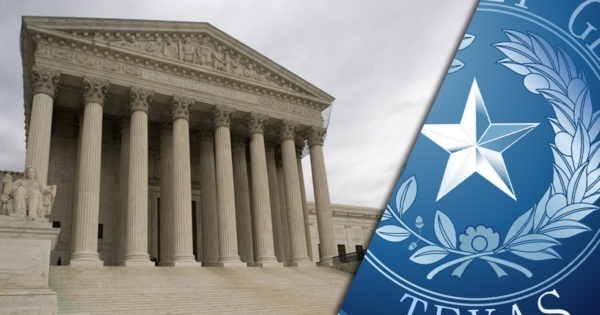
The lawsuit that the State of Texas has brought against four Defendant States – Pennsylvania, Michigan, Wisconsin, and Georgia – brings forth transgression by each state against the US Constitution. The Defendant States responded by playing vitriolic partisan politics.
Texas Attorney General Ken Paxton filed a lawsuit in the US Supreme Court on behalf of the people of the State of Texas charging that each of the Defendant States illegally and unconstitutionally changed election laws, treated voters unequally, and triggered significant voting irregularities by relaxing ballot-integrity measures.
Each of the Defendant States “violated statutes enacted by their duly elected legislatures, thereby violating the Constitution,” the lawsuit alleges.
In responses to the lawsuit – responses that were due by 3 p.m. ET Thursday, each of the four states rejected the allegations yet failed to address any of the legal or constitutional questions put forth in the lawsuit.
Pennsylvania Attorney General Josh Shapiro wrote that the request “to exercise its original jurisdiction and then anoint Texas’s preferred candidate for President is legally indefensible and is an [affront] to principles of constitutional democracy.”
Wisconsin Attorney General Joshua Kaul wrote, “Texas is unable to allege that Wisconsin itself did anything to directly injure Texas’s sovereign interests.”
Texas Attorney General Paxton and other state attorneys issued a reply, stating the Defendant States “do not seriously address grace issues that Texas raises, choosing to hide behind other court venues and decisions in which Texas could not participate and to mischaracterize both the relief that Texas seeks and the justification for that relief.”
“An injunction should be issued because the Defendant States have not – and cannot – defend their actions,” they added.
My office filed additional briefing in support of Texas’s lawsuit to protect the integrity of our elections
1) https://t.co/3gqRg6358e
2) https://t.co/dskf50Hfmw pic.twitter.com/kNZpYYbaIQ— Texas Attorney General (@TXAG) December 11, 2020
The Texas lawsuit does not seek to overturn the election results in any of the Defendant States. Instead, it asks the Supreme Court to remand the power of seating each of the Defendant States’ electors to its original source per the US Constitution: The State legislatures.
“Texas asks this Court to recognize the obvious fact that Defendant States’ maladministration of the 2020 election makes it impossible to know which candidate garnered the majority of lawful votes,” the Texas lawsuit response argues. “The Court’s role is to strike unconstitutional action and remand to the actors that the Constitution and Congress vest with authority for the next step.”
In going further to define the relief sought by the Texas lawsuit, attorneys highlighted the fact that inaction would disenfranchise legal voters and dilute legitimate vote totals.
“Inaction would disenfranchise as many voters as taking action allegedly would. Moreover, acting decisively will not only put lower courts but also state and local officials on notice that future elections must conform to State election statutes, requiring legislative ratification of any change prior to the election. Far from condemning this and other courts to perpetual litigation, action here will stanch the flood of election-season litigation,” they wrote.
Seventeen states are siding with Texas in their suit before the Supreme Court. Twenty-six states have voiced opposition.
106 US House Republicans have filed a brief in support of the Texas lawsuit in the Supreme Court. House Minority Leader Kevin McCarthy (D-CA), and US Rep. Liz Cheney (R-WY), did not sign on to the brief.
